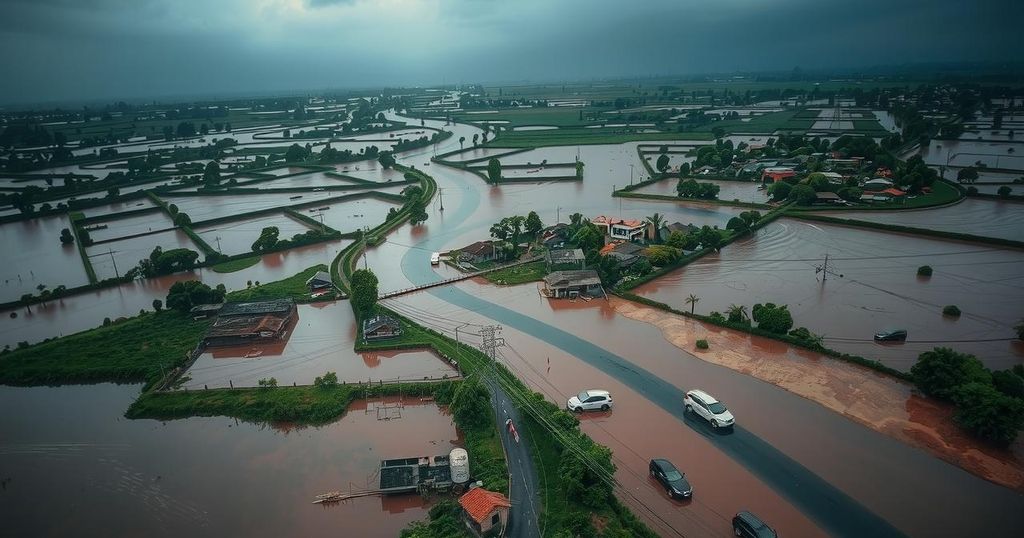Severe Flooding Worsens Health Crisis in South Sudan
Severe flooding in South Sudan has displaced over 226,000 people and submerged numerous health facilities, aggravating an ongoing humanitarian crisis compounded by climate change. WHO is mobilizing resources to address the health needs of affected individuals, particularly in light of rising malaria and suspected cholera cases.
South Sudan is currently experiencing severe flooding, one of the worst in decades, resulting in widespread destruction across the nation. The floods have displaced over 226,000 individuals, impacted livelihoods, and submerged crucial infrastructure, including roads. Affected counties include 42 out of 78, where 58 health facilities have been flooded and several others rendered inaccessible. As of October 4, 2024, approximately 890,000 individuals residing in these counties have been adversely impacted by the floods. The situation is exacerbated by the seasonal heavy rains typical from April to November, with climate change contributing to the increased severity and frequency of such natural disasters, leading to permanent community displacements. Compounding the flooding challenge is the existing humanitarian crisis, with South Sudan hosting nearly 800,000 refugees and returnees primarily from conflicts in Sudan. Health officials have reported suspected cholera cases and a spike in malaria incidences, with over 120,000 cases and 31 suspected fatalities announced by September 29, 2024. Recent weeks have also seen a surge in snake bites, with 55 reported incidents. “People are in a heightened state of vulnerability due to multiple shocks. WHO is committed to work with the Ministry of Health and our partners to ensure that they have access to essential health services continue while also prioritizing the response to growing humanitarian and health needs,” stated Dr. Humphrey Karamagi, the World Health Organization (WHO) Representative in South Sudan. In response to the disaster, the WHO has dispatched around 88 metric tons of emergency health kits to various regions including Renk, Bentiu, Malakal, and Bor counties. These supplies are designed to assist over 870,000 people and contain vital medical resources such as emergency health kits, cholera response kits, anti-malarial medications, and snakebite antivenoms. Furthermore, since the start of the year, WHO has provided close to 1,300 malaria kits nationwide and is strategically prepositioning cholera diagnostic tests and treatment supplies. WHO is coordinating with South Sudan’s Ministry of Health to enhance the health sector’s response to this escalating health crisis. Initial assessments have been conducted to gauge needs in Cueibet County, and training for health workers is ongoing to bolster emergency responses. Collaboration with local authorities and community leaders aims to shield medical facilities from flood damage and relocate essential supplies to safer locations. The WHO continues to monitor the health implications of the flooding, with a specific focus on diseases spread by vectors and water sources. This is part of broader efforts within the African region to foster climate-resilient health systems that can adapt to evolving health threats brought on by climate change. To successfully tackle these intertwined health challenges, robust frameworks and investments are required to enhance emergency preparedness and infrastructure resilience. Moreover, WHO advocates for sustainable health systems that not only address present health demands but also mitigate environmental impacts and support vulnerable populations in adapting to climate-related health challenges.
The ongoing situation in South Sudan poses significant humanitarian concerns, compounded by frequent flooding and the consequences of climate change. With the country grappling with armed conflict-related displacements and health crises, the flood-induced challenges exacerbate existing vulnerabilities and threaten health infrastructure and services. Understanding this complex interplay is critical for assessing the humanitarian needs and health response strategies necessary for relief efforts.
In conclusion, South Sudan is facing a dire health and humanitarian crisis compounded by severe flooding and climate change impacts. The WHO is actively responding through emergency health services and resource provisions, underscoring the need for sustainable infrastructure capable of withstanding climate hazards. Ongoing collaboration with health officials and community leaders remains essential to mitigate the crisis and protect vulnerable populations from further health risks.
Original Source: www.afro.who.int




Post Comment